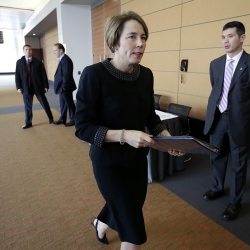Massachusetts is seeking to regulate the daily fantasy sports industry in a proactive fashion. The Attorney General of Massachusetts, Maura Healy, this week proposed new regulations which are meant to protect consumers in her state.
If Healey’s regulations are approved, the Massachusetts gaming polices could become a model for DFS in states across the United States. Since the Ethan Haskell scandal broke, Massachusetts has been one of the few jurisdictions to show sympathy for DraftKings and FanDuel. That like is because DraftKings is headquartered in Boston, so one of the industry’s biggest companies can be seen as a local business. In early November, Stephen Crosby, chairman of the Massachusetts Gaming Commission, said his agency did not consider DFS part of its purview.
Proposed DFS Regulations in Massachusetts
The regulations appear to be a serious effort to answer the problems facing the daily fantasy sports industry, instead of the political posturing which has characterized many offical reactions. The Healey regulations appear to be comprehensive enough to answer most of the complaints officials and fans have against the industry.
Suggested policies include:
Prohibition of DFS gaming for people under 21.
Transparency about who is playing and who sees player stats before contests begin.
Restrictions on TV and radio advertising.
Help for problem gamblers.
Rules to assure play is fair.
Protections for player deposits.
In making her suggestions, Maura Healy said she viewed daily fantasy sports as legal in Massachusetts. She also said she views DFS as a form of gambling. Since few states are likely to give the daily fantasy sports more leeway than Massachusetts, Healey’s stance on both issues is pivotal.
FanDuel Reacts Positively
In fact, the reaction from the two companies most affected by Healey’s announcement is telling. Their response represents a sea change in the daily fantasy sports industry, because both are thanking the Massachusetts AG for calling their industry “gambling“–a point both have challenged for years.
FanDuel released a statement which praised the AG’s response. The statement said, “Attorney General Healey’s approach towards regulating fantasy sports makes a tremendous amount of sense. FanDuel believes that regulations which increase transparency and ensure contests are fair will benefit the entire fantasy industry.”
“We also welcome the opportunity to work with Attorney Generals in all states, along with other lawmakers, to implement fair regulations that benefit both consumers and sports tech innovators.”
DraftKings Has More Reservations
DraftKings’s statement had more qualifications, but also was generally positive. In a likely reference to Healey’s contention that DFS constitutes gambling, DraftKings said, “While we do have some concerns with the draft regulations, we intend to work closely with the attorney general’s office to ensure we are operating in the best interest of our customers. We appreciate that, in addition to attorney general Healey, a number of state regulators and other authorities are taking a reasoned approach to the fantasy sports industry.”
For years, DraftKings and FanDuel have argued that the 2006 UIGEA gave license to the daily fantasy sports industry, because it provided protections for fantasy sports as game of skill. The two leading DFS companies also have contended the term “game of skill” means their industry is not gambling in the same way slot machines, blackjack, or lottery betting is. To climb down from that stance is to concede a major point, because it could lead to a ban in dozens of US states and regulation in the rest.
The Alternative to Maura Healey
New York Attorney General Eric Schneiderman issued a cease-and-desist order to DraftKings and FanDuel, because he claims DFS is gambling as well as illegal in New York State. This Monday, Justice Manuel Mendez of the New York Supreme Court denied the companies a restraining order against Schneiderman’s actions. He also announced a hearing on Wednesday, November 25 to decide the fate of daily fantasy sports in New York.
If Schneiderman has his way, fantasy sports is going to be banned in New York. If that happens, other states could follow New York’s lead. The action by Maura Healey therefore represents two clear paths: and the Massachusetts model is the lesser evil.

